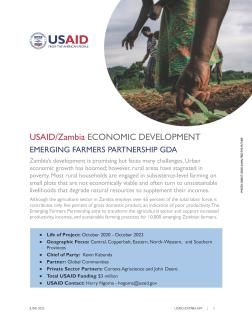Zambia’s development is promising but faces many challenges. Urban economic growth has boomed; however, rural areas have stagnated in poverty. Most rural households are engaged in subsistence-level farming on small plots that are not economically viable and often turn to unsustainable livelihoods that degrade natural resources to supplement their incomes.
Although the agriculture sector in Zambia employs over 65 percent of the total labor force, it contributes only five percent of gross domestic product, an indication of poor productivity. The Emerging Farmers Partnership aims to transform the agricultural sector and support increased productivity, incomes, and sustainable farming practices for 10,000 emerging Zambian farmers.
|
In recent years, the invasion of the fall armyworm has also threatened food security throughout the region. In addition, traditional practices of preparing the land, weeding, and harvesting require significant manual labor, much of which is provided solely by women. All these challenges result in food insecurity that is primarily affecting rural households.
USAID, John Deere, Corteva Agriscience, and Global Communities have come together to carry out a market-based approach to facilitate the Emerging Farmers Partnership (EFP) project. EFP will catalyze greater productivity of emerging farmers working with 20-60 hectares of land, support their communities, and contribute to building a resilient global food system in Central Province (Mumbwa, Chibombo, Kapiri Mposhi, and Luano), Southern Province (Chikankata, Mazabuka, Monze, Kalomo, and Choma), Copperbelt Province (Mpongwe, Lufwanyama, and Masaiti), Eastern Province (Petauke), and North-Western Province (Solwezi and Kasempa).
Youth and women will represent 30 percent of the project’s key beneficiaries and will be empowered with educational resources, technologies, and access to capital.
While EFP focuses on emerging farmers, it will also contribute to the reduction of rural poverty among smallholder farmers. The emerging farmers will improve the livelihoods of smallholder farmers in their communities by demonstrating improved practices, aggregating offtake, providing tillage and other services, and facilitating input credit.
Results to Date
- 680 farmers have been trained in Integrated Pest Management;
- 165 farmers have been referred to sources of financing for mechanization;
- 17 agro-entrepreneurs have received over $1 million in input and crop protection loans while one female farmer has received a tractor loan valued at $27,000; and,
- Partner in-kind leveraging to date amounts to almost $130,000.

